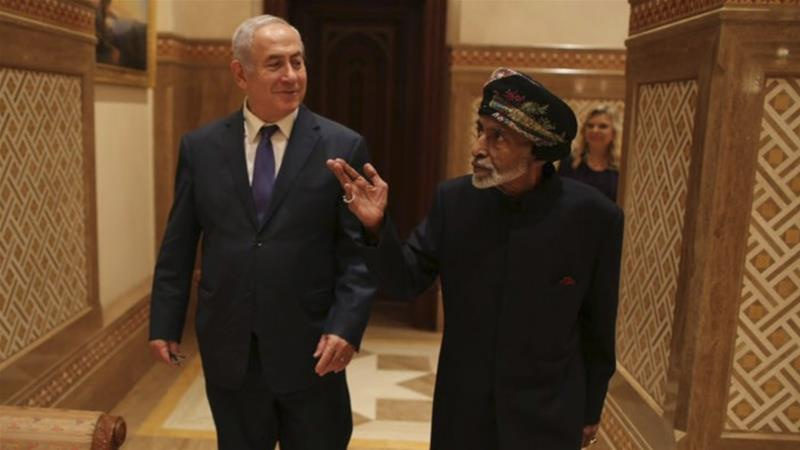Why Did Netanyahu Visit Oman?

Israeli Prime Minister Netanyahu met with Sultan Qaboos, the king of Oman, on Friday in Muscat. Although Tel Aviv and Muscat do not have diplomatic relations and Netanyahu's visit to Oman is the first Israeli leader's visit to this country since 1996, it seems that Oman also pursues its own goals in establishing and expanding relations with Israel. Especially since the relations between the two sides came to a halt in the wake of the formation of the second Intifada in 2000 which led to the closure of Israeli representative offices in Muscat.
But what does the head of government in Tel Aviv pursue from his trip to Muscat in this sensitive circumstances? Why among Middle Eastern Arab countries Oman should be the destination of this trip? Will Iran-Oman relations be affected in future in the wake of Tehran's objection to Muscat for Netanyahu's reception? Iranian diplomacy Answer these questions in a conversation with Seyyed Jalal Sadatian, Former Ambassador Iran in the UK and expert on Middle East issues It is followed up by the passage of the text:
Last week, we witnessed Israeli Prime Minister Benjamin Netanyahu's visit to Oman. From your point of view, what are the implicit targets for Tel Aviv in the current sensitive circumstances in the Middle East?
The first thing that comes to mind about the specific goals behind Netanyahu's trip to Oman is what Netanyahu's priorities are for this journey. In this regard, it seems that the first goal of the prime minister of Israel is serious confrontation with Tehran in the region and second, to follow the Palestinian issue. The transfer of the United States embassy to Jerusalem which has faced regional and global resistance has spurred Tel Aviv to overcome the resistance of some Arab states in the region. But I think the first and foremost goal for Netanyahu's trip is a serious confrontation with Iran.
But why Oman?
As an Arab country, Oman seeks to create a lifeline for Iran to bypass US sanctions, particularly the secondary sanctions. This lifeline includes crude oil exports, and various economic and commercial activities in the region. So practically, Oman acts as a bridge between Iran and the world. Because Tehran, on the one hand, deals partly with Ankara, and on the other hand, the Oman Sea is a good platform for Iran's trade relations. So Tel Aviv and Washington are looking for this link to Tehran. Netanyahu's visit aims to help Israel close this political, diplomatic and economic breather of Iran as much as possible, especially at the current critical circumstances that Saudi Arabia has suffered from the crisis caused by the murder of Jamal Khashoggi. Because it's possible to a certain extent that relations between Riyadh and Washington falter due to pressurefrom the American political structure and the international public opinion, especially knowing that the United States is approaching mid-term elections of the US Congress, and that Trump must be accountable to domestic public opinion in relations with Saudi Arabia; Tel Aviv is seeking to provide a base in Arab countries in order to follow its initiatives regardless of the United States and Saudi Arabia while the latter is involved in the murder of the critical journalist Jamal Khashoggi. But this secret trip is also as I pointed out, seek a solution to the Palestinian issue.
If Sultan Qaboos is looking to create a respite for Iran and maintain Tehran's lifeline during the US sanctions, why is Muscat's hosting of the Israeli Prime Minister seriously criticized by Iran?
There was an expectation on the Iranian side that Sultan Qaboos should not welcome Netanyahu. Because the positions that have been adopted so far by Muscat have been based on political logic and diplomatic flexibility, and their foreign policy has been absolutely reasonable. The Sultanate of Oman has the face of an impartial government in the region, which, simultaneous to the alliance with Saudi Arabia and its allies in the [Persian] Gulf Cooperation Council and the Arab League, has close ties with Tehran. This country has not had a negative attitude towards Iran in the Arab League. In this regard and in the context of the Middle East developments and amid rising pressure Arab countries led by Saudi Arabia on Oman to cut relations with Iran, Sultan Qaboos is always looking for moderating these pressures and mediation between the Arab community with Iran. But the fact that Sultan Qaboos himself receives Netanyahu on his visit can somewhat question Muscat's policies.
Can this have a significant impact on Tehran-Muscat relations?
No. This issue can not undermine seriously the relations between the two countries. Especially as in the current critical circumstances Tehran considers Oman as one of the levers to maintain its relations with the Arab community..
Media speculate that Muscat is trying to serve as mediator between Tehran and Washington. Since before the last round of nuclear talks between Iran and the P5 + 1, Oman hosted secret talks between high-ranking officials of the Islamic Republic of Iran and the United States. Taking this into consideration, are Oman and Sultan Qaboos basically capable of conducting such an initiative?
No. See, when Trump withdraw from the JCPOA, Merkel, as Germany's Chancellor and head of European Union's primary economic power, French President Emmanuel Macron, or British Prime Minister Theresa May could not persuade Trump. So obviously Sultan Qaboos will not be able to do this. But as far as Oman and Sultan Qaboos are making efforts along a country like Kuwait and its Emir Sabah Ahmed Jaber al-Sabah to keep the balance against Iran and as much as they have prevented the Gulf Cooperation Council to take any action against Iran is heartwarming.
* Interview by Abdul Rahman Fathollahi, Iranian diplomacy staff writer.

